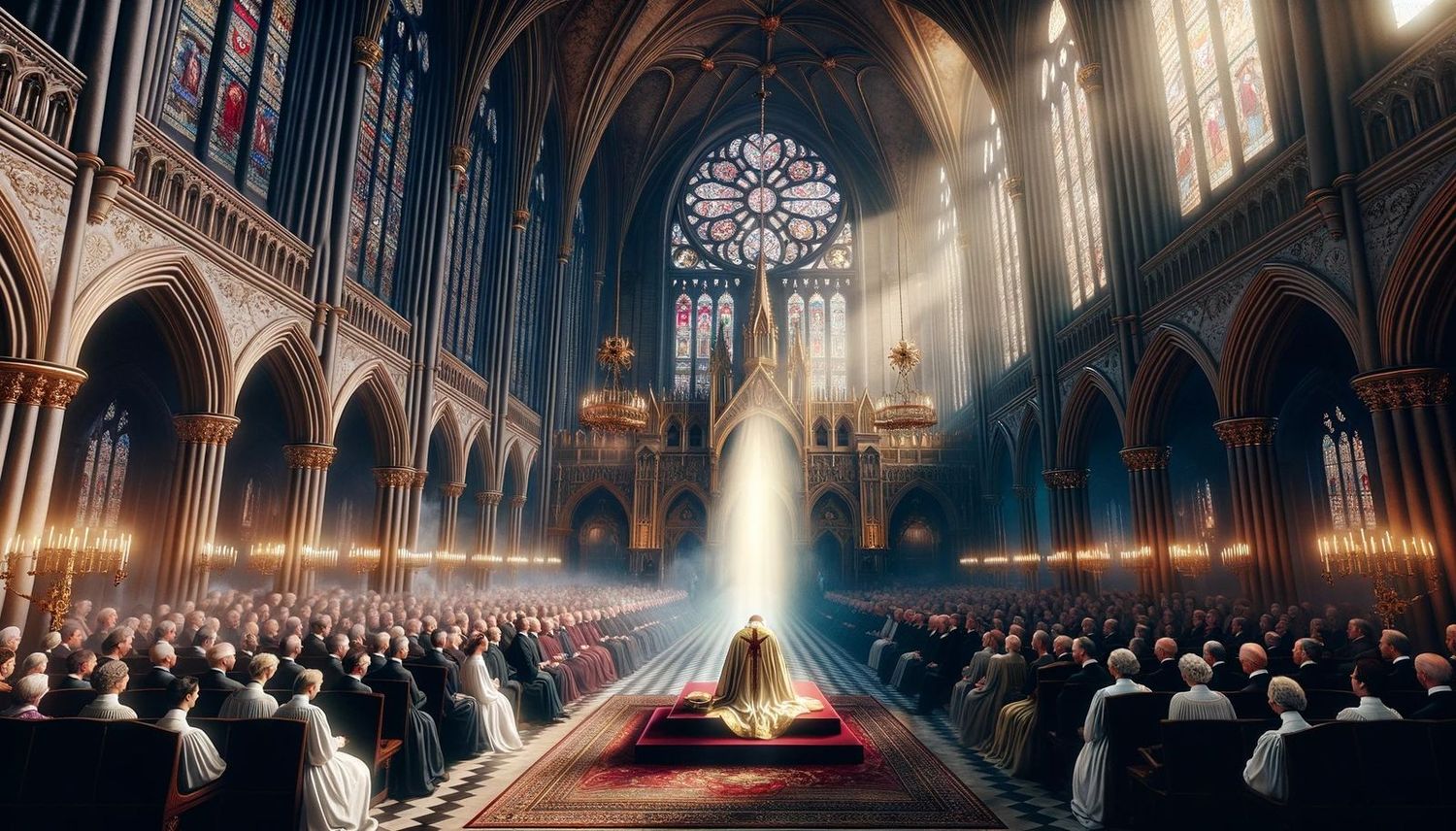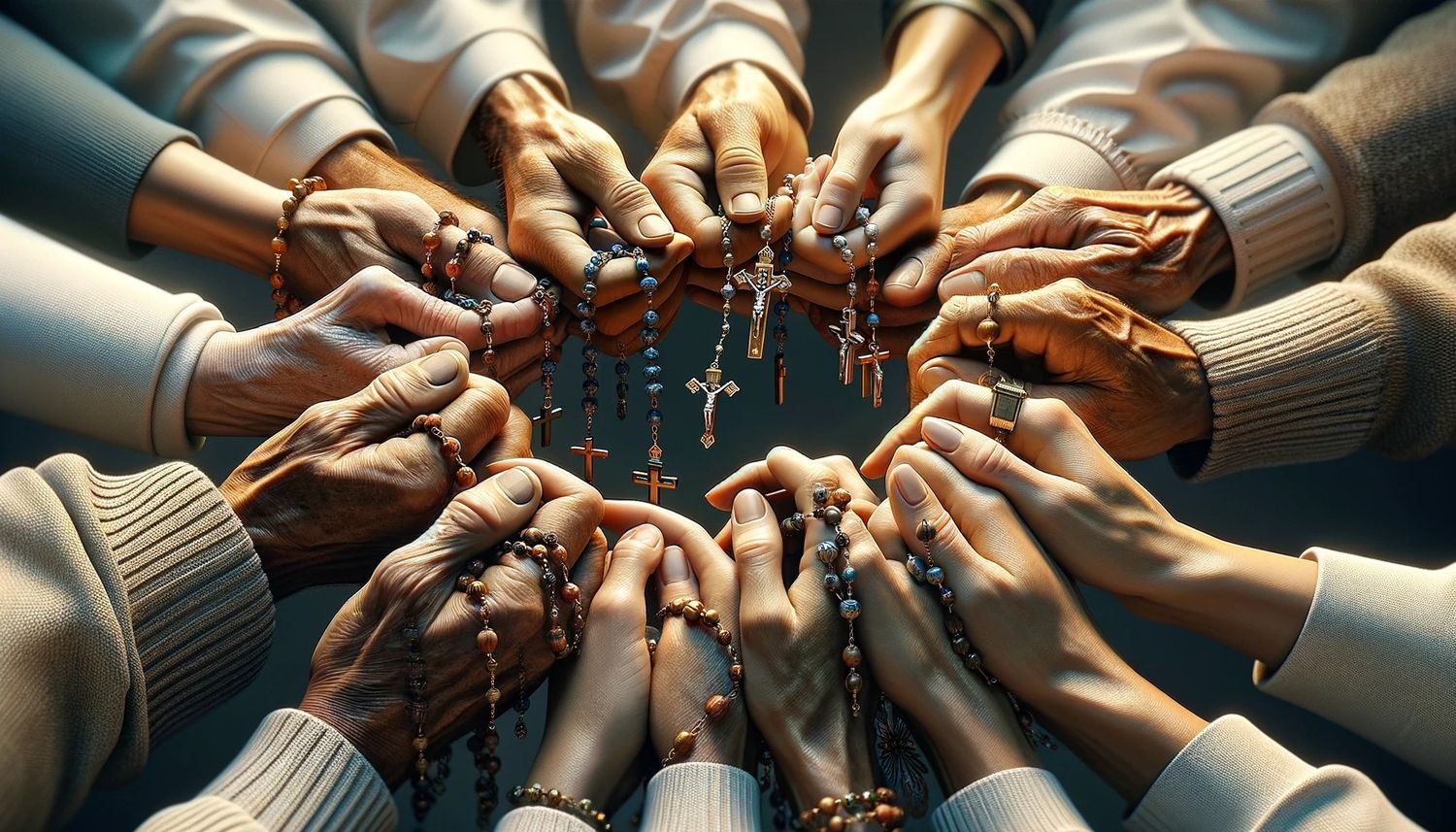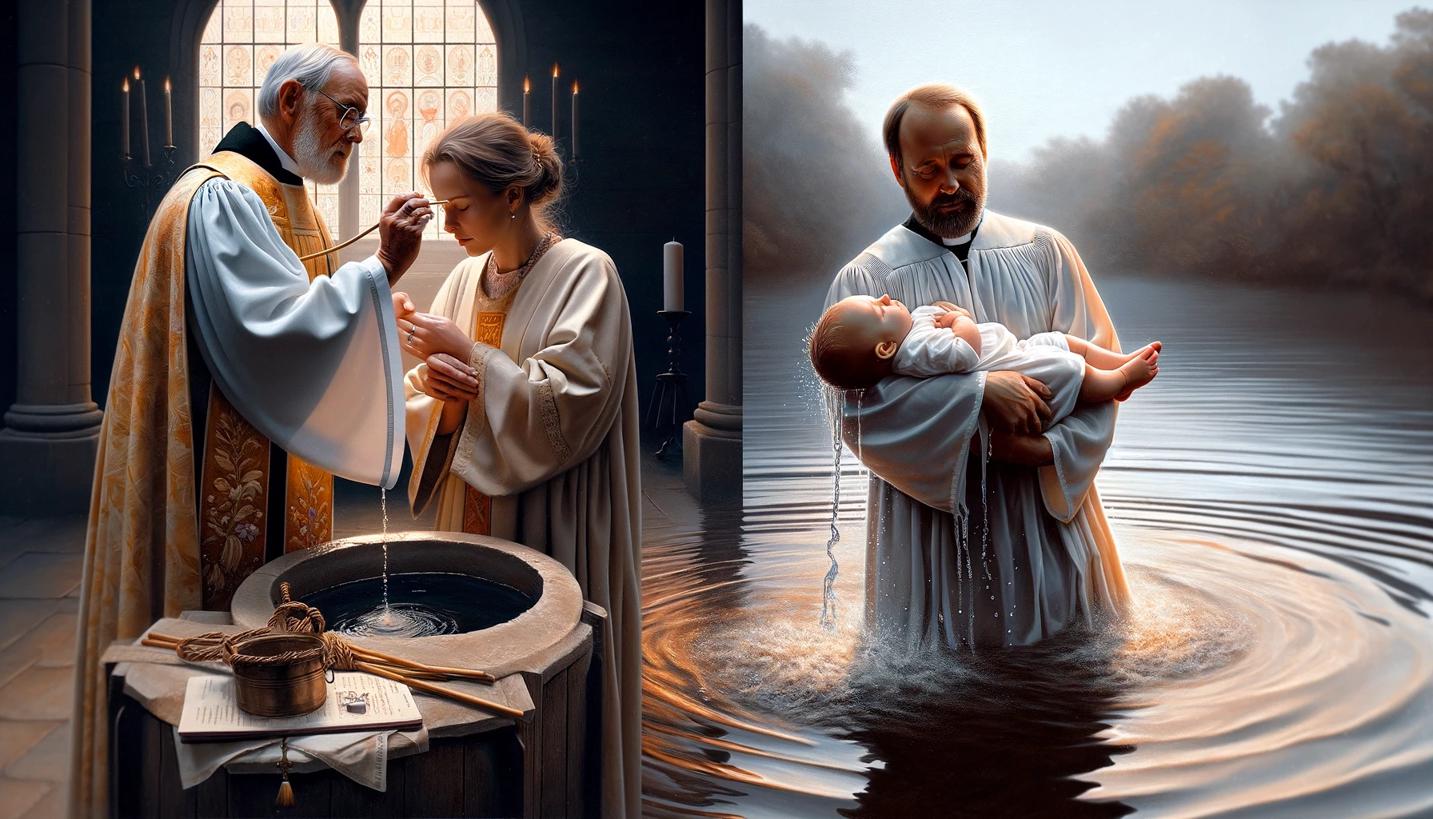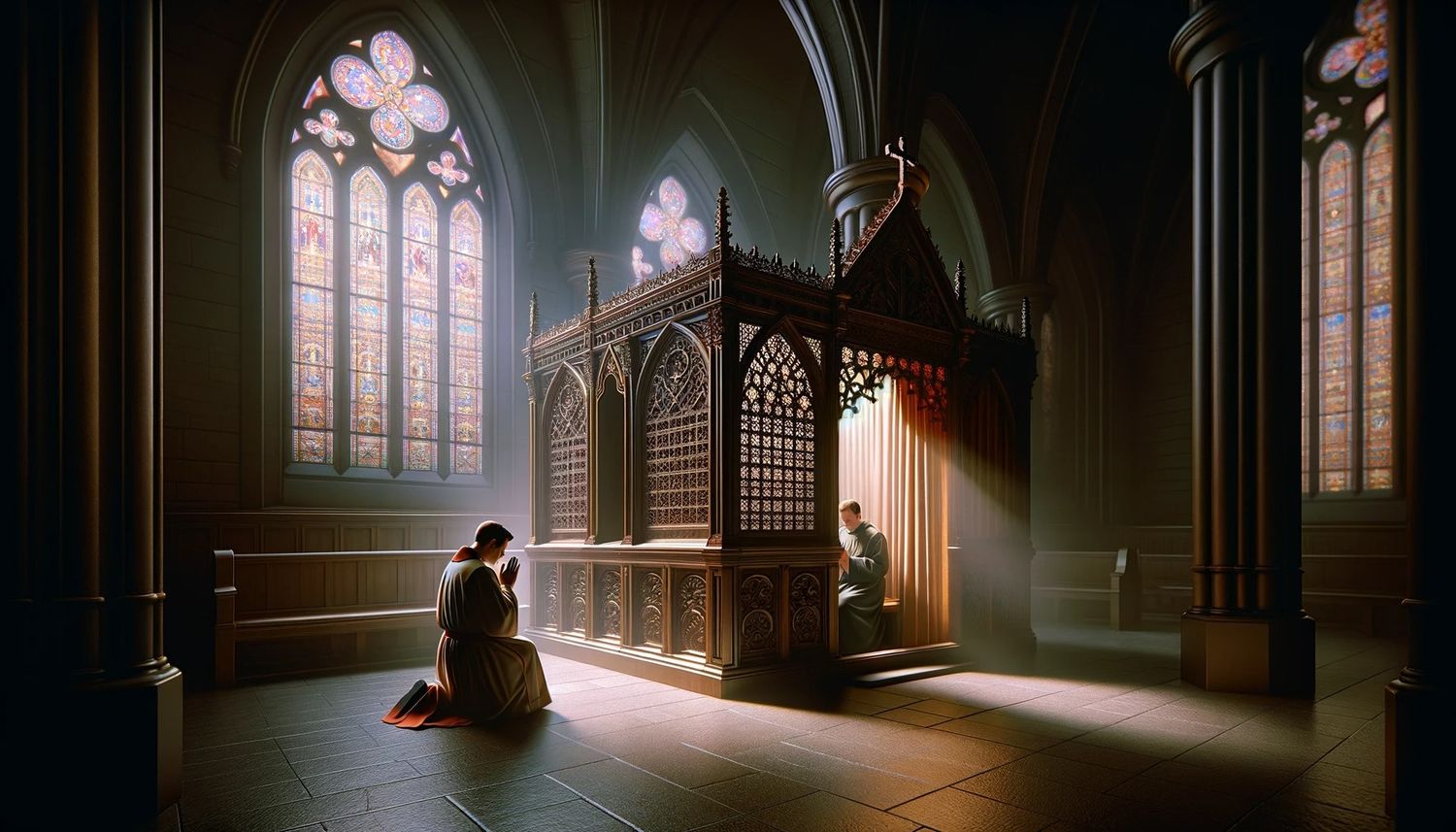Home>Theology and Spirituality>How Does An Anglican Convert To Catholicism


Theology and Spirituality
How Does An Anglican Convert To Catholicism
Published: February 17, 2024
Ericka Andersen, an editor at Christian.net, expertly merges digital strategy with content creation, focusing on faith and societal issues. Her communication skills enhance the platform's engaging narratives, fostering meaningful dialogue on belief's impact on society.
Learn about the process of converting from Anglicanism to Catholicism and the theological and spiritual implications involved in this transition. Explore the journey and considerations of embracing the Catholic faith.
(Many of the links in this article redirect to a specific reviewed product. Your purchase of these products through affiliate links helps to generate commission for Christian.net, at no extra cost. Learn more)
Table of Contents
Introduction
Embarking on a spiritual journey often involves profound introspection and a quest for deeper understanding of one's faith. For many individuals, the decision to convert from Anglicanism to Catholicism represents a significant and deeply personal transformation. This transition encompasses a myriad of emotions, challenges, and moments of enlightenment, ultimately leading to a newfound spiritual home within the Catholic Church.
The process of conversion is a deeply individual experience, shaped by personal beliefs, theological considerations, and a longing for spiritual fulfillment. It is a journey marked by introspection, contemplation, and a profound sense of seeking a closer connection with the divine. As individuals navigate this path, they often encounter a range of emotions, from uncertainty and apprehension to hope and profound spiritual awakening.
The decision to convert from Anglicanism to Catholicism is often rooted in a desire for a more traditional and sacramental expression of faith. Many individuals are drawn to the rich history, liturgical beauty, and theological depth of the Catholic Church, finding solace in its ancient traditions and profound reverence for the Eucharist. This longing for a deeper connection with the sacred often serves as a catalyst for the conversion process, propelling individuals toward a spiritual home that resonates with the core of their beliefs.
As we delve into the intricacies of this spiritual journey, it becomes evident that the decision to convert is not merely a theological shift, but a profound transformation of the heart and soul. It is a testament to the enduring human quest for spiritual truth and a deeper connection with the divine. Throughout this exploration, we will unravel the multifaceted aspects of this conversion, shedding light on the reasons, challenges, and ultimately, the embrace of Catholicism as a spiritual home.
Read more: How Does Anglicanism Differ From Catholicism
Understanding Anglicanism
Anglicanism, also known as the Church of England, traces its roots back to the Reformation era in the 16th century. It emerged as a distinct Christian tradition with a unique blend of Catholic and Protestant elements, shaped by the historical and theological developments of the English church. At its core, Anglicanism embraces a broad spectrum of beliefs and practices, encompassing a diverse range of theological perspectives and worship styles.
One of the defining characteristics of Anglicanism is its emphasis on the via media, or "middle way," seeking to maintain a balance between Catholic tradition and Protestant principles. This nuanced approach is reflected in the Anglican liturgy, which incorporates elements of ancient Christian worship while allowing for a degree of theological diversity within the church.
Anglicanism places a strong emphasis on the authority of scripture, the historic creeds, and the sacraments, particularly baptism and the Eucharist. The Book of Common Prayer, a foundational text in Anglican worship, serves as a unifying force, guiding the faithful through a structured and reverent form of worship.
Furthermore, Anglicanism values the role of bishops as spiritual leaders within the church, upholding the apostolic succession and the episcopal structure as integral components of its ecclesiastical identity. This emphasis on episcopal governance underscores the interconnectedness of local congregations within the broader framework of the Anglican Communion.
In addition to its theological distinctiveness, Anglicanism embodies a rich tapestry of cultural and historical influences, reflecting the diverse traditions and expressions of faith within the global Anglican community. This diversity is evident in the varying worship styles, theological perspectives, and social engagement initiatives embraced by Anglican churches worldwide.
Understanding Anglicanism entails recognizing its dynamic nature, characterized by a commitment to both tradition and adaptation in response to contemporary challenges. This dynamic interplay between tradition and innovation underscores the enduring relevance of Anglicanism in the modern world, shaping its identity as a living tradition rooted in the ancient faith.
As individuals contemplate the transition from Anglicanism to Catholicism, they often grapple with the complexities of their Anglican heritage, navigating a spiritual landscape shaped by the distinctive ethos of the Anglican tradition. This deep understanding of Anglicanism serves as a foundational element in the journey toward embracing a new spiritual home within the Catholic Church.
Reasons for Conversion
The decision to convert from Anglicanism to Catholicism is often rooted in a profound longing for a more robust connection with the sacred and a deeper engagement with the rich traditions of the Catholic Church. This transition is shaped by a myriad of compelling reasons, each reflecting the deeply personal and spiritual motivations of individuals embarking on this transformative journey.
Drawn to Sacramental Depth
Many individuals are drawn to the sacramental richness of Catholicism, finding solace in the profound reverence for the Eucharist and the sacraments. The Catholic Church's emphasis on the real presence of Christ in the Eucharist, along with the sacramental life that permeates its worship and spiritual practices, resonates deeply with those seeking a more tangible and transformative encounter with the divine.
Historical and Theological Depth
The rich historical and theological depth of Catholicism often serves as a compelling catalyst for conversion. The Catholic Church's unbroken connection to the early Christian church, coupled with its profound theological heritage and intellectual tradition, captivates individuals seeking a more robust doctrinal framework and a deeper understanding of Christian faith and practice.
Read more: How To Convert A Muslim To Catholicism
Unity and Authority
The Catholic Church's emphasis on unity and the authority of the papacy represents a significant draw for many individuals navigating the complexities of ecclesial identity. The desire for a centralized and authoritative leadership, coupled with a sense of global unity and cohesion within the universal Church, often resonates with those seeking a more cohesive and structured ecclesiastical framework.
Liturgical Beauty and Reverence
The aesthetic beauty and profound reverence of Catholic liturgy and worship often inspire individuals to embrace Catholicism. The transcendent nature of Catholic rituals, the sacred art and architecture, and the deeply contemplative nature of Catholic worship provide a compelling allure for those seeking a more immersive and spiritually enriching worship experience.
Longing for Tradition and Continuity
Many individuals are drawn to Catholicism's emphasis on tradition, continuity, and the enduring legacy of the apostolic faith. The Catholic Church's preservation of ancient traditions, liturgical rites, and spiritual practices offers a sense of rootedness and historical continuity that resonates deeply with those seeking a faith anchored in the enduring legacy of the early Christian church.
Seeking Spiritual Wholeness
Ultimately, the decision to convert from Anglicanism to Catholicism often stems from a profound longing for spiritual wholeness, a deeper sense of belonging, and a more profound connection with the divine. This quest for spiritual fulfillment and a transformative encounter with the sacred serves as a driving force behind the decision to embrace Catholicism as a spiritual home.
The convergence of these multifaceted reasons underscores the deeply personal and spiritual dimensions of the conversion process, illuminating the profound yearning for a more profound and transformative encounter with the divine within the rich tapestry of Catholic tradition.
Read more: How To Convert To Catholicism For Marriage
The Process of Conversion
The process of conversion from Anglicanism to Catholicism is a deeply personal and multifaceted journey, characterized by a profound exploration of faith, theological discernment, and spiritual transformation. It unfolds as a tapestry of introspection, prayerful contemplation, and a gradual alignment of the heart and mind with the tenets of Catholic doctrine and tradition.
At the outset, individuals embarking on this transformative path often engage in a period of intense reflection, seeking to discern the theological, spiritual, and practical implications of embracing Catholicism. This phase involves a deep exploration of Catholic teachings, the study of Church history and tradition, and a deliberate examination of the doctrinal differences between Anglicanism and Catholicism. It is a time of intellectual inquiry and spiritual discernment, marked by a sincere quest for a more profound understanding of the Catholic faith.
As the journey progresses, individuals often find themselves immersed in a process of spiritual formation within the Catholic tradition. This entails active participation in Catholic liturgical practices, such as attending Mass, engaging in the sacramental life of the Church, and embracing the devotional richness of Catholic spirituality. Through these immersive experiences, individuals cultivate a deeper appreciation for the sacramental ethos of Catholicism, allowing the rhythms of Catholic worship and prayer to shape their spiritual sensibilities.
Simultaneously, the process of conversion involves engaging with the Catholic community, seeking guidance from clergy, spiritual mentors, and fellow Catholics who accompany and support individuals on their journey. This communal dimension of the conversion process fosters a sense of belonging and solidarity within the broader Catholic family, providing individuals with a nurturing environment in which to explore and embrace their newfound spiritual path.
Furthermore, the process of conversion often entails navigating the practical and logistical aspects of transitioning from Anglicanism to Catholicism. This may involve formal catechetical instruction, the reception of the sacraments of initiation (Baptism, Confirmation, and Eucharist for those not previously Catholic), and the formal entry into full communion with the Catholic Church. These rites of passage symbolize the culmination of the conversion journey, marking a definitive and transformative moment of embracing Catholicism as a spiritual home.
Throughout this intricate process, individuals experience a profound inner transformation, as their hearts and minds become increasingly attuned to the spiritual rhythms and theological depth of Catholic tradition. It is a journey marked by moments of illumination, spiritual growth, and a deepening sense of belonging within the ancient and enduring embrace of the Catholic Church.
As individuals navigate the process of conversion, they are guided by a deep sense of spiritual longing and a profound yearning for a more profound encounter with the divine, ultimately leading them toward the embrace of Catholicism as a spiritual home.
Challenges and Obstacles
The journey of conversion from Anglicanism to Catholicism is not without its challenges and obstacles. Individuals undertaking this profound transition often encounter a range of complexities, both internal and external, as they navigate the intricate terrain of theological discernment, communal integration, and personal transformation.
One of the primary challenges individuals face is reconciling their deep-rooted connections to Anglicanism with the decision to embrace Catholicism. This internal struggle involves navigating a complex tapestry of emotions, including a sense of loss, uncertainty, and the need to reconcile familial and communal ties associated with their Anglican heritage. The process of relinquishing familiar traditions, spiritual practices, and cherished communal bonds within the Anglican context can evoke a profound sense of disorientation and emotional upheaval.
Externally, individuals may encounter resistance or misunderstanding from their social circles, including family, friends, and fellow worshippers within the Anglican community. The decision to convert to Catholicism can provoke tensions and interpersonal challenges, as individuals grapple with the need to articulate and defend their spiritual journey amidst differing theological perspectives and ecclesial allegiances. This external resistance can pose significant emotional and relational hurdles, requiring individuals to navigate delicate conversations and cultivate a spirit of understanding and empathy within their social spheres.
Furthermore, the process of integrating into the Catholic community presents its own set of challenges. Individuals may experience feelings of being a newcomer in a foreign spiritual landscape, grappling with the intricacies of Catholic liturgical practices, devotional customs, and the unique ethos of Catholic spirituality. This adjustment period can evoke a sense of cultural dissonance and spiritual unfamiliarity, compelling individuals to navigate a process of acclimatization and integration within the rich tapestry of Catholic tradition.
Additionally, the logistical and practical aspects of formalizing their entry into the Catholic Church, including catechetical instruction, reception of the sacraments, and the formal process of initiation, can present administrative and procedural challenges. Navigating the formalities of the conversion process requires individuals to engage with the bureaucratic dimensions of ecclesial life, which may entail a steep learning curve and a sense of administrative complexity.
Amidst these multifaceted challenges, individuals embarking on the journey of conversion demonstrate resilience, courage, and a steadfast commitment to their spiritual quest. They navigate these obstacles with a spirit of perseverance, guided by a profound sense of spiritual longing and a deep yearning for a more profound encounter with the divine within the embrace of Catholicism.
Embracing Catholicism
Embracing Catholicism represents the culmination of a profound spiritual journey, marked by a transformative encounter with the rich tapestry of Catholic tradition, theology, and communal life. As individuals navigate the intricate process of conversion from Anglicanism to Catholicism, they embark on a deeply personal and introspective quest, ultimately leading them to embrace the Catholic faith as their spiritual home.
At the heart of embracing Catholicism lies a profound sense of spiritual awakening and a deepening connection with the sacramental richness of the Catholic Church. Individuals find themselves drawn to the awe-inspiring reverence for the Eucharist, the sacraments, and the profound liturgical beauty that permeates Catholic worship. This sacramental ethos becomes a source of profound nourishment for the soul, fostering a transformative encounter with the divine that transcends the boundaries of earthly existence.
Moreover, embracing Catholicism entails a deepening engagement with the historical and theological depth of the Catholic tradition. Individuals immerse themselves in the intellectual richness of Catholic theology, exploring the profound doctrinal heritage and the unbroken connection to the early Christian church. This journey of theological discovery fosters a profound sense of intellectual and spiritual fulfillment, as individuals find themselves anchored in the enduring legacy of Catholic faith and practice.
Furthermore, embracing Catholicism involves integrating into the vibrant tapestry of the Catholic community, forging deep bonds of fellowship and solidarity within the universal Church. Individuals find themselves embraced by a diverse and inclusive community, united by a shared commitment to faith, service, and communal worship. This communal integration fosters a profound sense of belonging and spiritual kinship, as individuals find themselves woven into the fabric of the Catholic family, enriched by the diversity of its members and the collective witness of faith.
As individuals embrace Catholicism, they are transformed by the profound beauty of Catholic spirituality, the intellectual depth of Catholic theology, and the communal richness of the Catholic Church. This transformative journey represents a testament to the enduring human quest for spiritual truth, a deeper connection with the divine, and a profound encounter with the sacred within the embrace of Catholicism.
Conclusion
In the intricate tapestry of spiritual transformation, the journey of conversion from Anglicanism to Catholicism unfolds as a profound testament to the enduring human quest for spiritual truth, a deeper connection with the divine, and a profound encounter with the sacred. This deeply personal and introspective quest encompasses a myriad of emotions, challenges, and moments of enlightenment, ultimately leading individuals to embrace the Catholic faith as their spiritual home.
The decision to convert from Anglicanism to Catholicism is rooted in a profound longing for a more robust connection with the sacred and a deeper engagement with the rich traditions of the Catholic Church. This transition is shaped by a myriad of compelling reasons, including a draw to the sacramental depth, historical and theological richness, unity and authority, liturgical beauty and reverence, a longing for tradition and continuity, and a profound quest for spiritual wholeness. These multifaceted reasons underscore the deeply personal and spiritual dimensions of the conversion process, illuminating the profound yearning for a more profound and transformative encounter with the divine within the rich tapestry of Catholic tradition.
The process of conversion unfolds as a tapestry of introspection, prayerful contemplation, and a gradual alignment of the heart and mind with the tenets of Catholic doctrine and tradition. It involves a deep exploration of Catholic teachings, active participation in Catholic liturgical practices, engagement with the Catholic community, and the navigation of practical and logistical aspects of transitioning into the Catholic Church. Throughout this intricate process, individuals experience a profound inner transformation, as their hearts and minds become increasingly attuned to the spiritual rhythms and theological depth of Catholic tradition.
Amidst the journey of conversion, individuals encounter a range of challenges, both internal and external, as they navigate the intricate terrain of theological discernment, communal integration, and personal transformation. These challenges encompass reconciling deep-rooted connections to Anglicanism, navigating external resistance or misunderstanding, integrating into the Catholic community, and addressing the logistical and practical aspects of formalizing their entry into the Catholic Church.
Ultimately, embracing Catholicism represents the culmination of a profound spiritual journey, marked by a transformative encounter with the rich tapestry of Catholic tradition, theology, and communal life. As individuals embrace Catholicism, they are transformed by the profound beauty of Catholic spirituality, the intellectual depth of Catholic theology, and the communal richness of the Catholic Church. This transformative journey represents a testament to the enduring human quest for spiritual truth, a deeper connection with the divine, and a profound encounter with the sacred within the embrace of Catholicism.













